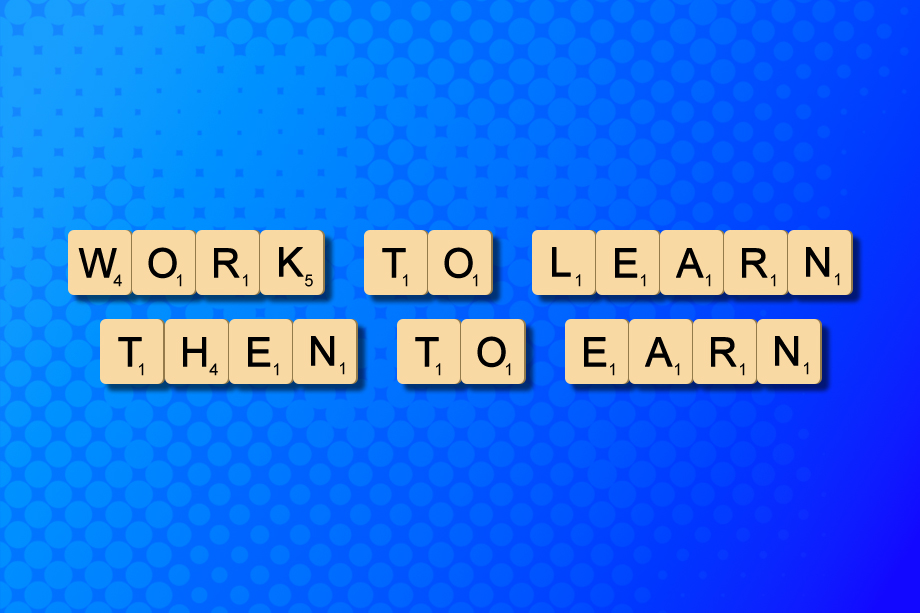When Robert Kiyosaki was a young man, the one thing his poor dad wanted for him was to get a high-paying job. To him, the path to success was to go to a good university, get your degree, find a high-paying job, and work your way up the corporate ladder.
Robert determined at a young age that wasn’t going to be his path. He wanted to be rich, and he knew that working as an employee, even with a high paying job, wouldn’t be the way to get rich. In fact, this is something most rich people already know.
Be careful what you learn
Because your mind is so powerful, it’s important to be careful what you learn. We all become what we allow into our heads; this is why it’s important to be proactive in your learning rather than passive. When you’re a passive learner, you become whatever others want you to be rather than what you want to be. When you’re an active learner, you take control of your life and your future.
Unfortunately, most people are passive learners, and as a result, they are perishing financially in a world that is active and changing.
Two mindsets about work
For example, take these two fundamentally different mindsets about work:
Robert’s poor dad, his natural father, said, “Job security is the most important thing.”
Robert’s rich dad, his best friend’s father, said, “Learning is the most important thing.”
The truth is, most people have learned to be employees. Generally speaking, the masses have one basic formula that they follow, which they typically learned in school: Work for money. The predominant formula seen in the world is that every day millions of people get up, go to work, earn money, pay bills, balance checkbooks, buy some mutual funds, and go back to work. That is the basic formula.
The problem is that those are the old rules of money. They don’t work in today’s world.
Then, there are those who will have a light turn on, realizing that work can be a path to something greater, even if you aren’t paid or are paid very little. These eventually become the rich.
Error: Campaign not found.
So what’s the differentiator? The rich have a financial education that they use to prosper. The poor have a traditional education that causes them to perish.
The learning mindset
The sad reality is that rather than looking at work as an opportunity to grow and learn, people look at work as a necessary evil to try and get as much money from their job as possible.
After graduation from the Merchant Marine Academy, Robert had a good career ahead of him. His first job was on a Standard Oil of California oil-tanker fleet as a third-mate. He made $42,000 a year, including overtime, and only had to work seven months of the year. His poor dad was very happy.
After six months, however, Robert resigned from his position with Standard Oil and joined the Marine Corps. His poor dad was devastated, but his rich dad congratulated him.
He joined the Marine Corps to learn new skills. He wanted to learn how to be a pilot and how to lead others through difficult situations. Robert knew that the leadership skills he learned in the Corps would benefit him greatly in life and business.
After his tour of duty, he had the opportunity to get a steady paying job as a commercial airline pilot. Instead, however, he took a job with Xerox as a salesman. Though he could have had a comfortable life as a pilot, he wanted to learn the skill of sales. He knew that skill, coupled with the leadership skills he learned in the Marine Corps, would make him rich. Again, poor dad was devastated and rich dad was happy.
Specialist vs. generalist
The fundamental difference between poor dad’s philosophy and rich dad’s philosophy about work was one of specialization versus generalization.
Poor dad believed that the best thing to do was to become increasingly specialized in your work. He admitted that people were paid more for knowing more and more about less and less. This is why he was so proud to get his doctorate. Yet, he always struggled financially.
Rich dad believed that the best thing to do was to become a generalist and to know a little about a lot. He said the best thing to do was to work in many areas of a company and pick up skills rather than a profession. He knew the best way to get rich was to be able to lead specialists across a wide spectrum of departments in a company.
How to learn like the rich
The things that separates the rich from the poor are rooted in how they navigate their education. If you’re tired of what you’re doing, or you’re not making enough, it’s simply a matter of changing your formula for making money.
The rich take control of their education
Years ago, at just 26 years old, Robert took a weekend class called “How to Buy Real Estate Foreclosures.” He learned a formula there that he hadn’t learned in school. That formula, once put into practice, has made him very rich. He also worked to learn how to sell while employed at Xerox. That skill has made him very rich, too.
Robert didn’t stop there, however. He’s continually learning new formulas and investing in his financial education. He has attended classes designed for derivative traders, commodity option traders and chaologists. He was way out of his league, but learned a lot that made his stock and real estate investing more meaningful and lucrative.
The point is that he took control of his education, and he is rich because he didn’t leave his financial education to what others wanted to teach or what he was told he should learn.
Error: Campaign not found.
The rich learn fast
If you want to take control of your financial education, most junior colleges have classes on financial planning and buying traditional investments. They are a good place to start, but always search for a faster formula. It’s by doing this that the rich make more in a day than many people will make in their lifetime.
The reality is that traditional education is often teaching yesterday’s formula. If you want to learn today’s formula, you need to be more proactive in your education and be learning much quicker. Consider attending conferences and seminars, reading books, and being mentored by people who are actually in the industries you’re interested in.
If you want to be a technical trader, learn from the best technical traders who are actually making money and working everyday, not from professors who have yesterday’s theories. The same is true for real estate, business, commodities, and more. These types of people know what’s changed, what’s changing, and how to adjust to prosper. They have valuable knowledge that will make you rich.
In today’s world, it’s not so much what you know that counts because what you know is old. Rather, it’s how fast you learn. If you can find information others are looking for quicker then they can, you’ll go far in life. It’s a priceless skill.
Embrace mistakes
Robert’s real dad, his poor dad, came from the world of academics, a world where mistakes are perceived as bad and are to be avoided. In the world of education, the more mistakes a person makes, the less intelligent that person is thought to be.
His rich dad came from the streets. He had a different view on mistakes; they were opportunities to learn something new. To rich dad, the more mistakes a person made, the more that person learned. He often said, “There is a bit of magic hidden in every mistake. So the more mistakes I make and I take the time to learn from, the more magic I have in my life.”
We’ve all heard the stories: Thomas Edison failed over 10,000 times before finally inventing the light bulb for his company, General Electric. Levi Strauss began sewing pants out of canvas for successful miners after he failed at gold mining. Michael Jordan is famous for saying, “I’ve missed more than 9000 shots in my career. I’ve lost almost 300 games. 26 times, I’ve been trusted to take the game winning shot and missed. I’ve failed over and over and over again in my life. And that is why I succeed.”
Each and every one of these success stories has failure and mistakes in common. One of the biggest barriers to success in life, both financially and personally, is our attitude towards failure.
The rich don’t play it safe
“Some of the biggest failures I know are people who have never failed.” -Rich Dad
Rich dad’s point was that because people try to play it safe, they never take any risks. And because they never take any risks, they never get ahead in life. They get stuck. Rich dad pointed out that he was successful because he had made many mistakes and had learned something new each time.
Error: Campaign not found.
And most importantly, he tried to not make the same mistake again once he learned from it. He called that moving from experience to wisdom.
Work to learn, not to earn
Today, you’re faced with many choices. Will you work to earn, holding onto security over opportunity? Or, will you work to learn (and get a financial education), giving up some security to embrace greater opportunity?
Most people will follow the conventional wisdom and choose to work to earn. But if you want to be rich, work for what you want to learn rather than what you want to earn. Figure out what skills you want to acquire before choosing a specific profession and before getting trapped in the rat race.
What skills do you need to acquire to live a rich life?





